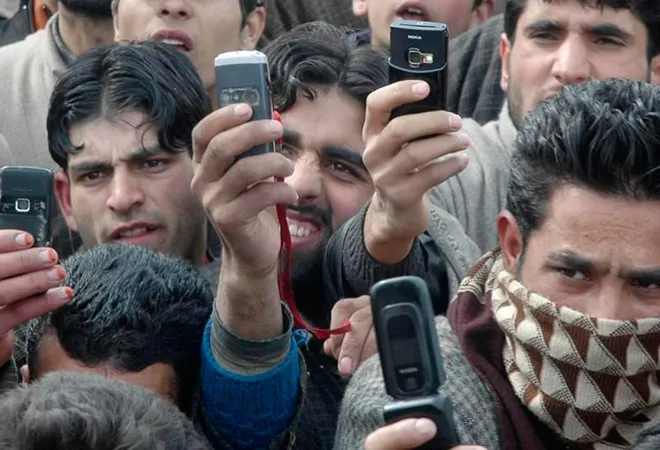-
CENTRES
Progammes & Centres
Location
It’s not even about aazadi now, the fight is for Allah and the faith.

A short visit to the Valley reveals that the sense of alienation is so total now that even provocations — the arbitrary five-hour ban on traffic on the main highway leading into the Valley for the duration of the Amarnath yatra — has raised only token protest. On paper, the situation is better than the past two years with the surface calm and no hartals and stone-pelting.
Officials say that there is a distinct downturn of Pakistani activity and camps have been closed even in the POK area. There are signals that Islamabad and Rawalpindi (they are now joined at the hip) want to resume the dialogue that was rudely interrupted in 2007 with the collapse of the Musharraf presidency.
But this could well be deceptive calm, akin to the situation on the eve of the Burhan Wani killing in 2016 that triggered mass protests and an upsurge of insurgency. But in this case, it means the new Home Minister Amit Shah seems to be in a different mood, laid out in two successive speeches at the end of June, which indicated that the man, whose administrative experience has been limited to Gujarat, was remarkably ill-equipped to deal with the complexity of a country like India. He spoke about the need to separate the people of the Valley from political parties being run by family elites. Just how he intended to bring this about was less clear, though the talk about panchayati raj had a touch of Gen Ayub Khan’s ‘basic democracy’ about it. Of course, the bottom line was that the government will continue its hardline approach to eliminate the insurgency or ‘terrorism’, as he characterised it.
Equally, he criticised Nehru for the ceasefire of December 1948. But had India actually recaptured the entire state, this would have today meant an addition of 4.5 million, mainly Muslim residents of ‘Azad Kashmir’ and Gilgit-Baltistan into the 12.5 million current population of J&K. The proportion of Muslims in the state could have risen to more than 77% (it is currently around 68%). Whether the BJP would really have been happy about that outcome is something we can speculate on.
But what has generated disquiet in the Valley was the reference to Article 370 that the Home Minister ominously underlined was ‘temporary in nature’. It is no secret that as a political party, the BJP, and its predecessor, the Jana Sangh, have vehemently opposed the provision in the Constitution. Their slogan— Ek Vidhan, ek Pradhan, ek Nishan (one Constitution, one leader and one symbol) — was raised to protest the special status given to J&K. The reality today is that most of the special provisions that really mattered have been eroded. Today, J&K is even more closely held by New Delhi than any of the other larger states. True, there are still unique provisions in the state’s Constitution but these are more by way of being irritants, rather than obstacles to national policy.
By attacking Article 370, the BJP wants even the fig leaf that covers J&K’s nakedness to be stripped away. And that is why Amit Shah’s comment in Parliament has deepened the gloom in the Valley. Some, including police officers posted in the state, are openly talking about the need to take up an entirely new ‘assimilation approach’. This sounds chillingly like what China is attempting in Xinjiang. Just what ‘assimilating’ 7 million Valley residents into the Indian state would involve is difficult to imagine. Presumably, detention camps, mass re-education classes, perhaps even the dreaded Chinese laogai, or thought reform through labour.
The current situation is serious because of the unrelenting negative narrative. In the hype of Balakot, we have forgotten that it was triggered by Adil Ahmad Dar, a local suicide bomber. Forgotten, too, is the rise of allegations of torture by the security forces and the death in custody of a schoolteacher, Rizwan Asad Pandit, in May.
The sense of alienation has kept afloat the local sentiment for militancy which is presently limited because obtaining arms and ammunition is no longer as easy as it was in the 1990s. But the human material is there and if it gets the right combination of incendiary materials, it can be re-lit and explode. Equally dangerous is the fact that those ready to take up arms are no longer talking about azadi or Pakistan — they are fighting for Allah, faith and jihad.
The militancy has now become a South Kashmir phenomenon, as against its northern Valley orientation in the past. It is not surprising that the Pakistani support efforts have been focusing on trying to expand it in Poonch and Kishtwar as well.
Home Minister Shah comes from a political background that is not particularly well-inclined towards Muslims. But even so, his moves may only be tactical. If so, they are misdirected. Parties like the NC and PDP have done signal service to the country in bringing back Kashmir from the brink.
If the government wants to halt the slide in J&K, it may be a good idea for Shah or the Prime Minister himself to make a public announcement that they do not intend to touch the ‘temporary’ Article 370, or 35A. If the government is serious about bringing about economic transformation, it should understand that that will not happen as long as long as there is no peace and tranquility in the country and its periphery.
This commentary originally appeared in The Tribune.
The views expressed above belong to the author(s). ORF research and analyses now available on Telegram! Click here to access our curated content — blogs, longforms and interviews.

Manoj Joshi is a Distinguished Fellow at the ORF. He has been a journalist specialising on national and international politics and is a commentator and ...
Read More +